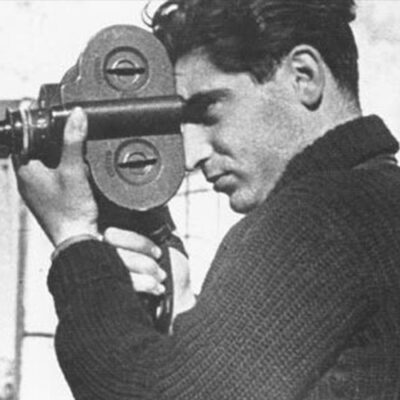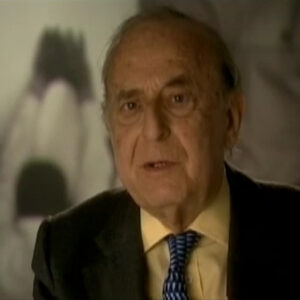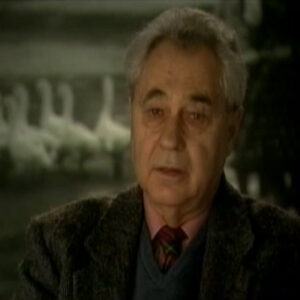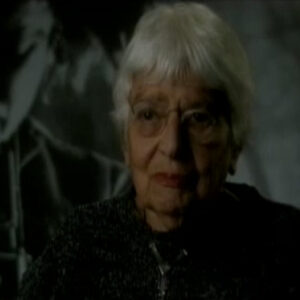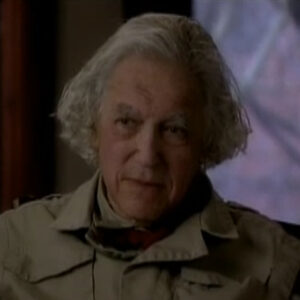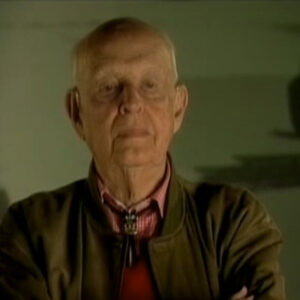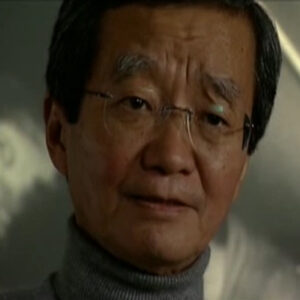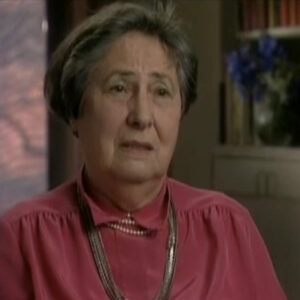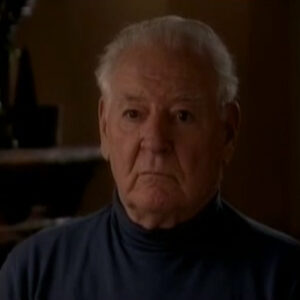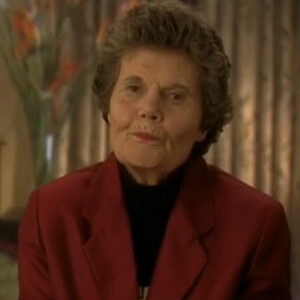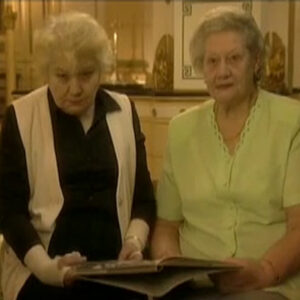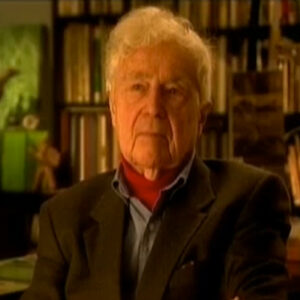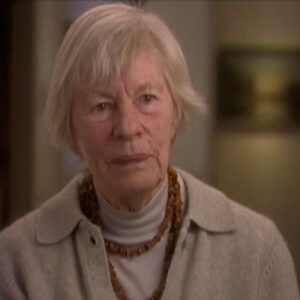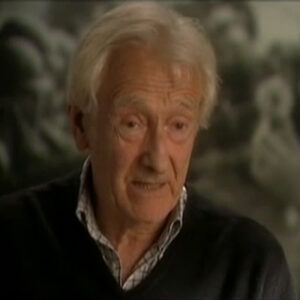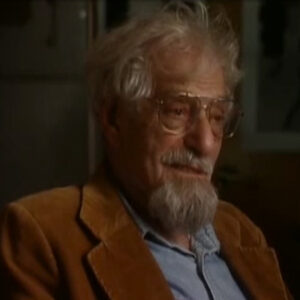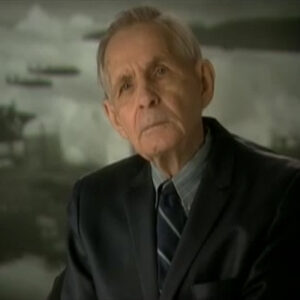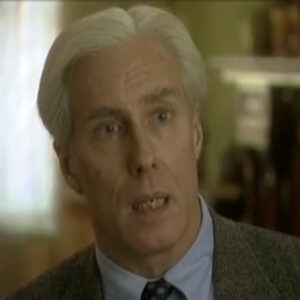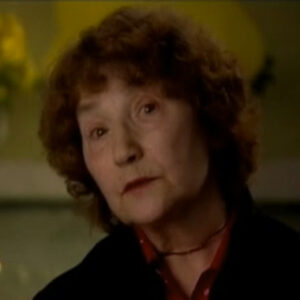Speaker When I met Kapa, it was in Paris, I met Kobad twice, I met I met him first time in Paris and I saw him through my life different times. I didn’t see him all the time because he was somebody with a lot of work to do, especially out of place out of France. But he loved by so much and he had he was part of a group of people. That was right after the war, the French liberation. That was when I came to Paris. And I probably met him maybe a year or two later because at that time we used to leave maybe a little bit later than two years, maybe three years further, because we all used to be in a part of Paris, which is Milton, and about the desert, which is a place where everybody used to meet. It was very, very simple. It was everybody was very young and starting their own career without knowing it. So they are this place. A lot of people will meet and have a drink or coffee. It was this bar, which is the most important part of the right bank, you know. And so I met him there because I used to stay in the Hotel Avenue Montaigne. And this hotel used to be filled with young people from fashion photographers, and they all became very known afterwards. But we didn’t know, you know, we stayed there because I was working a lot in the in the in the kitchen, of course. And then there was this mixture of people. So Capa would come to those places, to the old hotel to stay or to the ballot cards for a drink. So to tell you exactly how I met Kapadia, I had for me because, yes, in my memory, somebody who was very alive, very, very seducing and very charming. And he loved women. So at that time, I know he liked me very much because, you know, that was I was part of the life here at that time. And he wanted I start to see him going out with him, not going out. I never had special sentimental life with them, but that was very close to him. So I used to see him every time he was in Paris. And then I saw him later in Switzerland.
Speaker Oh, well, what was it about Cappa that everybody loved so much?
Speaker But what he had to charm, you know, he was he wanted to seduce you, wanted to be sure that you liked him. And I think because I think he was from he was born from Europe, Central Europe, Budapest, Budapest. That’s right.
Speaker And he had this charm, you know, almost Oriental, the look, the eyes and the smile and the way of being with the woman, which was really trying to seduce. So that’s very attractive. You know how.
Speaker But that was very physical. Was he serious was me?
Speaker I was it was it was not serious. Well, I’m sure he was, you know, in the bottom of his heart, but he was somebody who used to play is give the feeling that he was playing in life, playing his personal life, playing his work, playing death. You know, he had no she of anything. And so he would tell you, I don’t think I don’t remember him telling us, I mean, as a group of friends what he had done, where he came from. But then suddenly, if you had coffee or lunch with him or he was suddenly with one person that you like very much, it would start to talk. But he was not using that to in his personal life, using that the part of his work, which was very dangerous and the sort of adventure he was an adventurer, I think. And now he has a lot of charm and sometimes I think of him, I was thinking the other day that, you know, Wokingham knew more than you’re reading about all those photographers.
Speaker I’m interrupting you because I hear a siren, OK, but you’re doing very, very OK. That’s the way we get this. It’s beautiful. Thank you very much.
Speaker Because I know when I said something like, you know, otherwise it’s coming back. And I think while you’re as you speak, that’s why it was good not to talk about it too much before because we’re alive and we’re OK.
Speaker OK.
Speaker OK, so you know what, the photographers that now that you read in the papers, being shot dead, being killed during the wars or disappearing or being kidnapped sometimes I think, you know, those photographers at that time, like Capa, like Shimkus, so many of that group of photographers were so talented. They live the most dangerous life and they died in doing their work, you know, so Capa disappear like that. And so he came into my life the way he disappeared, you know, because you had the feeling from nowhere. You know, this with this lightness of of being, you know, you never impose on you, but love to go to a nightclub, you love to drink. He was a drinker. He was ill. This was this maybe a Russian pardon himself. And he loved the fact, you know, that he loved friendships. And that was he was a great person. I miss him. I miss him. So reading all about those photographers and the danger of the I always think of Capa is somebody that never disappeared from my memory, even if I don’t think of him all the time. Of course not. But I met him on different occasions. So talking about the animal day, I used to see him and he was somebody could be very unhappy and happy love, you know, because he was always passionately in love for somebody. And at one moment he was passionately in love. It told me about. That’s why I know. But Alah was a very famous model and a dear. And she was Chinese and she had this beautiful look and a bit mysterious. And he didn’t know. He couldn’t he couldn’t figure out if she was in love with him or not. So that made him mad, you know, because you it was something you wanted the things right away. So he had this severe passion. Then I saw him. Of course, he had different people during life. You know, when I used to see him, he had different love affairs or passions.
Speaker But I didn’t follow one by one. But this one he had and I saw him in clusters. We were there. A group of I was very close to Peter Viertel, you know, and he Kepa was there and he came with visually he had an affair with him. He was madly in love with me and he came to close to us. But that was at the time when she was a bit sick already. She was happy. She was sick. She would remain. And I remember we all met when I say, oh, it’s like it must have been in show. Peter, Bob, Paris, you know, people from Hollywood and Cappa would come. Then we would have a great dinner and drinks a lot of vodka. And I remember him to seduce Vivian. He started to dance a Russian dance. You know, I don’t know. It has a name that was so funny because he was drunk and he would fall and he would fall on the floor and he wanted everybody to do the same, you know, and he was insisted. Insisted because. So that was at the time. I don’t think this love affair was very happy and I don’t think it went very far. But what year would that have been? That probably was a I’m not sure of the date. My memory is very effective. I have to date, but it must be fifty three or fifty four, maybe fifty four near the end of his life. Yes, he died in 54, so it must be before 53, I think Jenny. Or maybe it was you know, I can’t remember the date, the exact date, but that was probably the last time I saw him.
Speaker Some people have said that at that time of his life he was kind of depressed, doesn’t.
Speaker Well, he is he was a character, a complex character. As I told you, I think he was playing in life and happy, fun drinker, a party lover side of him never had totally that sort of nostalgia in himself that you could feel and you could see it in his eyes. You know, that was a it’s probably somebody maybe from his birth, from where he came from, maybe from from his past. You know, he was his wife was killed. Now, am I wrong?
Speaker She they actually never married. But yes, his first real love was this woman. He died three. She was born in Spain.
Speaker Yes, that’s right. So I think I think he had this sort of a sadness. But was he sad about some? Priss, was it his nature? I would think it’s it was his nature, he was a romantic person, a total romantic, which is very beautiful. He was not perfect, you know, which is good. But I didn’t live with him. I didn’t have enough intimacy to know how he was in private life. But as I said, life, he had so much charm that he was somebody you couldn’t resist to like, you know?
Speaker I mean, you don’t have to answer this question about it, but I was surprised. Why didn’t he fall in love with you? I can’t imagine having.
Speaker I think you did have. I think you fell in love with me a bit. Yes, of course. But he was he was somebody always in love with a woman, you know, for you, for a woman, for the idea of a woman. But at that time, I think I was very pretty. And and I was at the time when I used to work a lot and I was at the time of, you know, my care was very brave. And that was probably I think he was attracted by me, but. He understood it never he was very discreet and very charming and very delicate in a.
Speaker Forced it on nothing, so we remain very good friends.
Speaker Some people have accused him of being I don’t know if this translates, but being a womanizer, you know.
Speaker Somebody who plays around with women?
Speaker Yes, well, probably, yes, he had all these bad side of it is it’s a bad side. I don’t know. In a way, it’s very attractive. A man who plays with women, it’s very because each woman wants to win, you know, so that gives a bit of a game. But who did would like really who did you love really? That’s a mysterious pattern in himself.
Speaker Did you ever meet his girlfriend in New York? No. She would come to Paris sometimes with Jamie or Jamie.
Speaker I met. Yes. I think he had this girlfriend coming. Yes, he had somebody from New York coming. I remember I don’t remember exactly how she looked, but I know he had a girlfriend and that story was not easy. I think if I remember he had a problem with that story, love story, he always had a problem.
Speaker I think Capa was somebody with problems. You needed them. You know, he created them. Maybe that’s his nature.
Speaker He certainly put himself in danger all the time.
Speaker And I think that’s the adventurous side of himself. And maybe he was somebody who played in life, played for everything if you are a gambler. Gambler, he was a gambler, too. I forgot he was a gambler. So if you’re a gambler, you gamble in everything. And I think gambling life, too, in that gamble in love. And so he made his life all around that he was attracted by that.
Speaker I’m curious about that attraction, about that need to gamble, to take chances.
Speaker I just I don’t know if, you know, it’s you can’t explain that. I know I have a phone saying that you can’t explain. It’s something you have in yourself. It’s unconscious. It comes from a subconscious thing. It’s something you can’t decide now and become a gambler. You are born again. It’s a mentality. It’s a way of thinking.
Speaker It seems that he started to gamble playing poker and stuff right after Jaradat died in Spain that I didn’t know.
Speaker But they used to play at this group of Hollywood people. They used to play a lot of gin rummy and for high stakes, you know, and they’re very, very famous people. Like I’m speaking your own show. I don’t know if or when you play Irving Lazaar. I mean, all this group around Hollywood, they were playing among themselves actors, very known actors. So Capa probably was involved in that sort of life.
Speaker To who were the just going back a little bit, who were the famous people or the people who are not yet famous, but became famous that were hanging around at the bar, at the hotel and like playing?
Speaker I mean, it’s so funny because it’s a whole story of what happened afterwards. They would be Bangali. He would come there to write down these books. It would be Zambelli was a very famous, not famous at the time, but a great, beautiful dancer there was whose whole decision drama because the theater was facing the hotel so everyone would be in the theater, would come and have a at any time after the theater or any time. And then the people from the fashion, because the Mizoguchi used to be something like that, that everything of simultaneous a total fashion street at that time, they were not no novitiates. There was Joe and there was which was the main thing. There was a father not far. And all those people used the Mancur, you know, all the models from the fashion houses, everyone you meet there. So there was there was famous artists who became. And then there was John Journalist from Match magazine, because the match was in round the corner, so they would be a a movie, it was who died, it would be Shimkus. Come with Kapa. They would be. Kathy was there would be, you know, all the names of those people became so famous afterwards and the what were the what was Cartier-Bresson like at this time? You know, I think if I remember, he used to be the same look except younger, but the same personality. But he used to be in the group of CAPA and the the very different personalities there. You know, how would you describe their differences by character, by. I don’t think my son is a gambler. I mean, that sense of Capa was, you know, life was not an adventure the way maybe it is in himself. But Capa was a total adventurer, gambler, adventure, passionate. I don’t even if Cartier-Bresson has had a passion for a woman or a passion for danger or passion for life, it was in himself. You would show it by his pictures, but get it, but they didn’t do the same pictures.
Speaker Oh, right. And that’s what I was just coming to his. What do you think? Why do you think Kabo is a photographer? What do you think he wants to do with his pictures?
Speaker I think it was a very sensible, sensible, sensitive, sensitive person, and within a week, yes, I think if I was a sensitive. Person and a lot of things in life touched him, and I think humanity, puffiness, suffering, people suffering from something, and I think you wanted to be part of life by showing it to other people. Maybe that’s how it started. But it’s hard to explain for me, but.
Speaker Thinking about it and now remember his personality, I think it was a way of expressing himself. And he loved people, he had a great sense of communication to people, and I think through the photos, he could communicate what he saw.
Speaker But, of course, to see. More than other people, we had to be in places where a lot of people were not going to like was different times, you know. Difficult times, I mean, and. So all that he was a witness, but not for himself, he wanted to give it to the other two other people to those pictures.
Speaker That was great.
Speaker I don’t know, maybe I invent all that, but why not knowing who he was? It could be true. I hope it is true.
Speaker All right. OK.
Speaker Yeah, I mean, who knows, right? We’re all talking about what we think.
Speaker Yes, it’s very difficult to know exactly what the people think because you can’t be in somebody’s skin or mentality or head or hard feelings. But you can have with your own sensibility, you can adjust what you see and what you think of a person and make a sort of reality, sort of truth, which is not dishonest, because if you do it with the with the positive side side, the worst is when you do it with the means and you distract people. So you you change the reality because but you should do it with yourself, with love and positive and reality for your own reality. You can’t hurt somebody’s memory thinking maybe you would have done that, you know, because I really had a great feeling for Kapa.
Speaker I miss him. Mm hmm.
Speaker Yes, of course, you know, when you miss people, when they’ve been part of your life and as I was saying, walking in different places, you think, oh, my God, Kapa would have been there. And suddenly an image of Kapper would come back. And I told him not long time ago, somebody talk to me about Kapa. And then I thought the ducting, the reason for the dream, I can’t remember the word. But to go from that to another thought and another thought, I thought about Allah. You see, I goes to. And then he was very close to Litvack and nothing.
Speaker That’s Salah. I see the pictures or.
Speaker That’s. They’re very beautiful mazzella with you. That’s it.
Speaker You know, she was a real beauty, very mysterious, and they could look.
Speaker Were you at this point, if you would get on that beautiful Woodwards, yeah, OK, OK with that. No, but, you know, so far forward that I was like, OK, yeah.
Speaker OK, so do you think that I understand?
Speaker I thought if you could just say that, I just thought that that’s a that’s that’s that’s the way she looked very beautiful. Look at the shape of the body. Great. And this beautiful attitude.
Speaker She was very tall, very beautiful. Were you at this party, do you think? Where was it that kind of.
Speaker Christian, your.
Speaker It could have been the end of a collection after just at the end of a collection of because she probably was showing that dress, your dress, and that’s still on the left of her, huh? Is it you? Yes. Because, you know, it’s interesting to me that Kapper chose to such different things to photograph because he also became a fashion and he loved to be in the backstage and photographed for life. And I think he did pictures of me somewhere, probably a jack that he loved to go backstage to photograph the girls, the life there. It was not doing fashion for the dresses. He was doing fashion pictures. Who? The person for the man model or the atmosphere and all the people in the salon. The public.
Speaker That’s interesting.
Speaker So he wasn’t so again, even though he was taking pictures in a very different setting from where it was, the people who say, yes, I can’t remember if I posed for him, maybe I did for Life magazine a fashion picture. I might have done that movie or fashion picture. But, you know, being a photographer like Capa, you can do anything. You can photograph a cat or a beautiful woman or a dead soldier the same. The same. I don’t think you just do this, you know.
Speaker And what about Kepa, make him able to make something?
Speaker A great picture out of those we look up, I always remember him with a camera around his neck. That was his second skin, he had the camera always, I think I did around the neck, but he was always ready to take a picture. So that’s probably the fact of being a photographer. You can’t stop. You know, it’s not a job. You stop. It happens all the time. Suddenly you feel it comes to you. You didn’t know. But you have your camera and.
Speaker So that’s I thought a lot about, huh, well, I have a theory about photographers that they they are people that need something between them in life, you know, that thing. But doesn’t seem to me to be true of capital.
Speaker You mean that the picture, the photo, the cabinet will be the son of a frontier between the subject of himself? Maybe, but I don’t see it like that. I think with the camera, you go further with your eyes. That’s you go right to where you want to, but at least is a sort of a.
Speaker Peepshow, when I say of life.
Speaker I hate to think of another word because that sounds so voyeurs, really.
Speaker Yeah, you have to be aware. Yeah, you have to look through something to look at life. It’s another frontier for me. Not at all. It’s a way of going further. But, you know, there’s so many pictures now being taken, it doesn’t mean anything anybody can take your picture.
Speaker Think I was an artist.
Speaker Yes, he was.
Speaker I think so, but he was an artist with the sense of.
Speaker A reality.
Speaker He was a dreamer, but not a. Not far away from reality, it was a dream, I think, a dream I knew that probably that romantic side of him you would have loved to to love, you would have to you would have loved to have everything perfect. But he was looking for something, I think.
Speaker What do you think it was looking for puppy love? People, yes, but maybe not maybe not enough.
Speaker Maybe you wouldn’t have never found it. You know, some people never find because they’re not made for it. That was maybe this nostalgic.
Speaker Feeling you would give. Something that would never happen.
Speaker Could have been about Karradah, you know, his first love.
Speaker Yeah, so maybe he was born knowing that, you know. His first love is she died and maybe who knows if he because when a person dies, you make you build up something afterwards. I would think for me and again, I’m not sure what I said, but I would think he was born with this sort of a nostalgia for something that he looked for all his life and maybe did know what. It was never, never happy enough or never very happy.
Speaker So interesting.
Speaker I refer to my notes for clusters.
Speaker Yeah, yeah, OK, I wanted to ask you about because we’re going to clusters and we’re going to we’re going to, I hope, interview a guy who was his ski instructor. They’re very, very clever. Dr. Rosen. Excuse.
Speaker Yes, I know. I’m probably fluffy, fluffy flowing. Yes, I know. I know. And I it’s because he’s been too close to us. Like I was, too, like a group of people, those people from Hollywood who created close to us. And so he was there. You know, they came several times. I didn’t see him myself because I was working in Paris. But every time he came to close to us, I probably saw him.
Speaker And what was it like for you there to ski?
Speaker Is was killed together. You know, it was a skiing knife and then which was very important. It was to meet for dinner or Winshaw show with the center of life there, you know, and then there was a Natalie that was included a lot at that time. That’s how I went to close to the first time because I was very tired and I needed to rest and was doing a lot of work. And so Litvack said and Sylvia was a great fan of mine. She was a mother, too. He said, why don’t you come too close to us? So that’s how with the first time then I met Peter and so. But. This group of people, they were the most interesting people at that time, you know, and still are some a lot of them are dead, but they were great creator of their work or they were movie directors or they were writers or they were actors and producers. And each one had a great personalities and always were. And Capra would come because he was part of this group, too.
Speaker And it’s interesting that also that he he could be part of that group and something else. Yeah, he seemed to fit in everywhere. Yes, yes. Yes. But that chameleon. Yes, he could fit in with movie producers or hang out with the bartender.
Speaker I don’t think his being a comedian I think is being yourself and you and you don’t have to adjust yourself. You just live through.
Speaker And I think I would leave if he was himself, you know, so he would leave as well as in another show in Cambodia or or in Paris or in close to us or in New York being the same. He was Kapa. So he was you remain calm about his life, did were you with him when he was with John Houston? Yes, of course it was John Huston I got I forgot about the news that. Of course. Yes. This group of people with the most talented people, if I think back, you know, I’ve been with them for several years and I I live my life with them.
Speaker Do you have any stories about Harper with any of these people?
Speaker That’s really I tell I told you I said a story about because that was the main instance of Kappa’s character, being in love with a beautiful woman, bringing where we were having a lot of drinks, vodcast out of his cars and dancing like crazy, like your white Russian dancer and falling at the same time, you know, but everything was violent with him.
Speaker Do you remember I know you mentioned Arlo and Vivien Leigh and other girls. I can’t remember really. I can’t remember name.
Speaker I can’t remember the names of the girls must have had a lot.
Speaker Yeah, I did. Do you have any any special memories of this time of year in the South?
Speaker Of course it was. Yes, there was a period of Biarritz, again, with the same group of people, the movie people, the same group of Hollywood. And there he came. I saw him there, but for me, the souvenir of Kapa is more linked to Paris first because Paris for him was. The restaurant, the bistros, the cafes, the fashion houses, the models, the Magnum agency, the journalistic part of his life, all that for me is Kepa and happening in Paris and classes because Klosters was there, the group because I know you went there, but Jingu enough to.
Speaker Remember something of that specific and then you could talk. I don’t know if you can at this time, but I would love to hear you talk about the liberation of Paris photograph.
Speaker I know I was not in Paris. No, no, no, no. I came after the war, after liberation. I was in Normandy.
Speaker It would have been much safer to be in Paris, I’d tell you, because in Normandy, you being American, you know, coming from America, you you probably had somebody in your family who’s been in the war in Europe, in France, you know, but being in Normandy was a terrible, terrible time. I grew up grew up with war in a way because there was an occupation and war before and the liberation. So that’s a part of your life.
Speaker Very, very strong. And but I came to Paris afterwards to work. And so I did beautiful pictures of the liberation in Paris, but I wasn’t there. So I can’t remember nothing of that. I didn’t know I was going to know. I’m wondering I love what you said.
Speaker When you say you grew up with war, I wonder if your friendship was deepened by both of your experiences with war.
Speaker No. I don’t think so, though, we probably talked about, you know, because I really was coming from those places which have been so hot and that time, you know, near home and the car and all those places we’ve been living through bombs and death and killing and all this and all the youth.
Speaker So when I came to Paris, I was very young and probably told me I’ve been there, you know, because he was in the war. He was in Normandy during the liberation. So and he’s done all those beautiful pictures of famous pictures, but we probably talked about it. Yes. I don’t think that’s why I think he liked me as a woman.
Speaker That’s it.
Speaker Well, of course, I think during what he called I don’t know whether he would have ever said this to you, but his black year and it was his black year because his passport was confiscated and that’s why.
Speaker So maybe you could send it. Yes, I remember he had the problem. He had several problems. He didn’t have an easy life because I think he was without a passport or nationality for a long time, for a while. And I think, you know, at that time when you it’s not that important. But I remember him talking about this problem of passport without being without passport. Why? I can’t remember why. Because I remember him talking about that with Shimkus, exactly where which cafe it was. I don’t remember. Maybe it was the cafe which was at the corner near Match magazine, which was called a Bellfield. Yeah, that was a cafe we used to be or maybe it was the floor, you know. But I remember sitting at the cafe table outside on the terrace was Shimkus Koppa and he was talking about his problem of passport.
Speaker So I don’t know how it came back to him, but I think he was feeling a bit worried because of that.
Speaker You know, what happened was that he was during the McCarthy scare in the Cold War and he was accused of being communists. And then I saw his passport was confiscated. His American passport was taken away because he was accused of being on the bus.
Speaker He got it back.
Speaker He was exonerated.
Speaker It was never it was a crazy time, but he also had a very bad back at that time.
Speaker That’s I remember he had a back problem. Yes, because dancing like crazy, you know, like a Russian. Yes, he had a he was suffering from his back. That was just who would do, you know, very often my back maybe, you know, he had a very dangerous life doing his work and maybe did some movements or things that you have to be very, very strong to survive all that.
Speaker So maybe he was hurt when he was hurt and he went into a nursing home or a clinic in London because his back was so bad. But as soon as he got a little bit better, he went out with the nurses.
Speaker I had to work with him and he had to have the nurses up dancing, but Kepa was such a flirtatious seducer that you would see you see anyone who would seduce somebody was the nurse at the hospital in London where he went back. You went for his back. And of course, he was you know, it was such a convention also that. He was convinced it could convince anybody that he was the only one. So that probably took the good news out of the hospital to go dancing, but that was his life. You know, he had to seduce all the time to have fun.
Speaker You know, it is just beautiful women or seductive to everybody.
Speaker I think you like gold seducer, they seduce anybody, everybody, but, you know, you would have affairs with Pretty Woman.
Speaker Everyone, Shah wrote that that people love to be in the bathtub every morning and spend two hours every morning in the bathtub, and Irwin Shah wrote that every morning, I had to change from Andre Friedemann, which was his real name in Budapest, to Robert Capa, the famous photographer, world known romantic. So there was this part of him, the boy from Budapest, and then the think is background, never left him.
Speaker There was a Budapest. That was when I said he had that in his character. I think he really had it. And of course, it was looking at life through that part that I that’s that souvenir. You know what he was he never forgot who he was, where he came from. And so he lived. I think he had, as you say, a chip on his shoulder. Another thing that’s probably what it is, this part of his background that remain like something he was against, something, you know, against poverty, against and unfair things in life and sort of the warriors for the good cause. But then he became the photographer was the civilized part of his life.
Speaker I think it was both, you know, it was fantastic. It was just great. And he came to Paris, I believe it was 40 acres and miraculin for you to do in the world. Yeah, yeah, yeah. He formed a film company, a television company with Steinback. Of course, that was.
Speaker Yes, I heard about that. That was what it was.
Speaker And I believe was 1948. He came to Paris. He wanted to do a television story on the Paris fashion shows. So I wondered if you had seen him at that time.
Speaker That’s maybe when you talk about me.
Speaker Remember his first first meeting we had when I said I met him through all this crowd in New York, that it could be the same time through his work because probably as he was doing, he wanted to do a film on fashion. You probably contact girs people from fashion houses. And as I was working at Jacques Fat and Jacques, that was one of the the best, most famous stars in Paris.
Speaker So I’m sure he came there and maybe talk to me or ask me or something.
Speaker And that’s probably came. Don’t we have a picture of Kapoor directing the.
Speaker No, it’s not between OK, sorry that happened to you, OK? You know, I think that I’ve asked you all the questions that I have and you have an absolutely fantastic researcher. I left everything out. Is.
Speaker A physical description of how the Hielo cap, I looked, it was very strong, I mean, strong energy, strong energy, and he had this face with a beautiful black eyes that’s always remember his eyes because he had this look, the look of a. Velvet look, but he had this not nostalgia in the eyes, a bit sad, you know, which is very often and then in cases people are very intelligent and very, I don’t know, intelligent. If you was the most intelligent. I don’t know. But with a creative character that gives something. And plus, he was a very tall and he would dress a bit sloppy in some raincoats or coats, I didn’t care very much, though I’m sure it was very careful about his clothes. But the way well, then there, too, he was to people. You would wear them casually, very casually, like, no, no. But and they must have been should you know, it was not a hippie style at all. Not at all. But he was a bit careless. Not too bad, you know, but sort of a careful closed to fashion, I mean, not fashion for a man at that time didn’t exist, but close to good, close with the touch of a careless and a bohemian sort of. Yes. You know, I’m sure coming from Budapest, he was a bohemian. That’s why I ran around the world all the time.
Speaker You know, his parents were both tailers.
Speaker So we knew about jackets. I think you knew about clothes, but. There, too, he didn’t use it too much, you know, it was done with sort of like this, you know, sort of a not careless in the bad way, but not.
Speaker With elegance.
Speaker And panache has more than Spanish as the word panache. He wanted to post something maybe. To himself or the world or his friends, it was a competition all the time. I never thought that Capa was somebody who could be at peace in himself. He was not.
Speaker Oh, OK. Then there’s the Caribbean. There was a little camera move when you said that he wanted to prove something and that was really great. If you wouldn’t mind saying that again, you think he had something to prove or disprove something.
Speaker I think if I had to I wanted to prove something or prove it to myself or to the world through his pictures or to his friends, but I think he was never he was always trying to prove something. And maybe I don’t remember being never give me the feeling of being somebody at rest, at peace with himself. It came from his background to. Yeah, tough life, tough, very, very poor, that’s it, that’s what you think, you know, when you know him, you know, it’s somebody who’s been through a hard time. So that’s why he was angry and he wanted to show through his pictures when it was tough for other people. It was touched by that.
Speaker So I was just going to tell you something, which is that some people have described him as having bedroom eyes, that that’s what you call bedroom eyes, what what people say about bedrooms, eyes.
Speaker It’s like when I say as a velvet, I know because that’s it gives you the feeling that it’s more than what you think makes you dream a bit.
Speaker Fantastic.
Speaker Is there anything I haven’t asked you that, you know, you can keep asking me questions?
Speaker I think I asked you everything I can think of, but, you know, I want to tell you something.
Speaker Maybe you can use it or not. But I mean, from these people, from Magnum and since then since when I knew Japan, they made that agency. The people among them were very close to me without me knowing them very well, because I knew them through Kapos were the ones I could see Shimkus word. And every time I read the name of Magnum, I always think of a copper. Always. Still, no. You know, when I with Magnum Agency photographer for Magnum Agency, it gives me a sort of a chinning, which I don’t have for the rest of the agency, you know, because it’s a. It was at a time when all those people were so talented. And he created it and he created it.
Speaker So, you know, that’s nothing, I just remembered something I didn’t need to ask you. Which is OK. I forgot the.
Speaker Just to.
Speaker I have a tissue, a really wonderful combination of people that he knew that he’s close to, and Peter probably will tell you something. He will have good stories. Oh, yeah.
Speaker So my last question that I almost forgot this about when he died, you know, how you heard about his death a.
Speaker The year he died was in 1954, I’d heard it.
Speaker I was in Paris, I think.
Speaker I probably was working in Paris posing for some things, some of them fashioned word of God and I’m sorry, I’m just going to have to cut because of the noise outside work or something.
Speaker What is it I don’t know, it is.
Speaker Well, I may be, yes, at a time.
Speaker OK, let’s we’ll go with it.
Speaker No, not right. Is it all right now? Yes.
Speaker OK, OK, so sorry, but, you know, if you could took when you were off campus and when I was in when Kapa died, I didn’t see him for a while because I think he went away for quite a long time doing maybe not at the same place, but. But then I heard he died. How did I heard it? Probably somebody told me maybe it was in the papers or something that. But that was in Paris and. It is a shock, of course, when you lose as a friend like that with that way, but to I don’t remember where exactly I was in Paris, I probably was as I was working it out, maybe I was in a studio, maybe I was, you know, but I was in Paris.
Speaker Do you remember what you felt at that time?
Speaker I was very shocked. You know, it’s. Not something that you don’t receive like that with no emotions, you know.
Speaker Did you think about. Well, I don’t know what you thought about it then, but it seems to me he gambled so much with his life. I don’t know.
Speaker I didn’t think about his life being like a game, like a gambling game. I thought it’s part of his. Work, dangerous life.
Speaker But, you know, it was very young still. It was young today. I think it’s it’s not unfair because he was in that sort of life that can bring you to that sort of death. But for the people outside, it’s a bit too young. You know, he had so many more things to do. I don’t know if he had a girlfriend at that time, maybe she’s the one who was in New York. I don’t remember, so I didn’t. After that, there was there was just sort of the nothing around Kepa, you know, for me, I didn’t know his family. I didn’t know he had a brother, I think. But I saw his friends. I saw Shimkus, who died himself two years later. But I saw all the fans like Litvack, like I Cho, like Peter. I mean, everyone knew that Kapa died. So we probably talked about I heard about him. But then, you know, that’s life, unfortunately disappears.
Speaker Can you imagine Campbell getting older? Can you imagine?
Speaker I know that already some people you don’t you had that sort of the energy that. Forcing us to think about the age. I can’t see is one of few people I know, I know, I have that who had that? I never thought about him. Different the way he was when I knew, you know, I never saw him further than that.
Speaker Do you think he would have wanted to be, you know, to live a long life and be an old man?
Speaker I mean, I think to one start, I’m sure he never thought of himself like that. When you live dangerously, you don’t think about the future.
Speaker When you see yourself sitting down the walking badly and, you know, you probably don’t know what’s going to happen. You have a maybe a strange feeling that you might not happen, that you grow older quite nicely and.
Speaker That’s part of gambling, too. We felt somehow immortal.
Speaker Maybe that’s when you live dangerously. You have to think you’re immortal, otherwise you’re a loser. You want to win? More against death many times, that’s the thing.
Speaker Five for other wars, he did win.
Speaker Yeah. Yes, because you went through so many dangerous places. And being a photographer and being the way he was, I’m sure he was always ahead, always in front.
Speaker He’s never been a photographer who took, you know, sort of a. Backstabs. He was there maybe before or with the military’s fault, always was, he was always the first infarcts. I wonder I would have done.
Speaker During those new was now what you would have done, it would have done the same being a. Being there, they would have done beautiful pictures to. Afghanistan, Afghanistan. I guess I’m happy to talk about the Iraq.
Speaker I go to Kuwait, I mean, I think there was so much to do for him there. With this point of view to. There certainly has not been any level war, no, and very photogenic like Afghanistan with a very photogenic war. I mean, the people there with the soldiers and those landscapes, and they could have fit totally well with Cowpat. So the winners is close to death, I mean, the people that all of them Inessa without thinking of which which part they were, I mean, those people were so close to being a man and the surrounding nothing else, sort of terrible poverty, general poverty that it would have been. I think that’s again, you think was that far away from Kapalua.
Speaker How inside you would have done great pictures?
Speaker Yes, yes, you would have felt. So you see, you can always invent what would you have done? What that you would have done. Beautiful picture. The son or her last collection? I sure you would have done you could have done anything.

